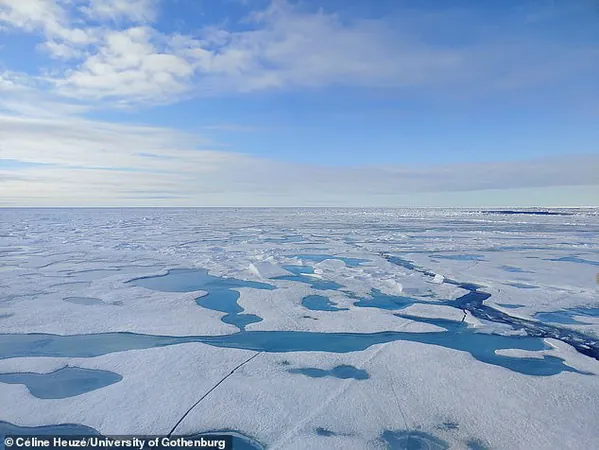
Arctic's Ice Meltdown: Are We Just Three Years Away from an Ice-Free Summer?
2024-12-03
Author: Benjamin
A Stark Warning from Recent Studies
A groundbreaking new study has issued a stark warning that the Arctic could be ice-free by as early as 2027, signifying an alarming milestone in the ongoing battle against climate change. This significant decline in sea ice is not just a statistic; it represents a dramatic shift in Earth's climate system that demands urgent attention.
Current Sea Ice Conditions
As of this year, the sea ice coverage in the Arctic has plummeted to a mere 1.65 million square miles, considerably below the average of 2.65 million square miles recorded between 1979 and 1992. Scientists have become increasingly concerned, using advanced computer simulations to calculate that the first summer devoid of sea ice could happen within the next three to twenty years, regardless of human efforts to curb greenhouse gas emissions.
Chilling Predictions
In a particularly unsettling twist, nine out of the 300 simulations indicated that ice-free conditions could manifest as soon as three years from now. This scenario paints a chilling picture for Earth's ecosystems and weather systems, as the absence of Arctic sea ice is likely to alter prevailing weather patterns dramatically, leading to extreme events such as frigid temperatures reaching as low as -4°F (-20°C) in regions like Italy and increased forest fires throughout Scandinavia.
Significance of the First Day
Dr. Céline Heuzé, a lead researcher from the University of Gothenburg, emphasized the profound implications of losing even a single day of Arctic sea ice. "That first day will symbolize our drastic alteration of a crucial marine environment," she stated. The warming Arctic Ocean will absorb more heat than usual, making it increasingly difficult for sea ice to reform, thus setting off a domino effect that could melt vast areas of ice continuously.
A New Approach to Measurement
In an interesting twist, the researchers decided to measure the momentous occasion by predicting the very first 24-hour period the Arctic might be entirely free of sea ice. Historically, studies focused on the first month without ice, which is defined as 30 consecutive days with an ice extent below 386,000 square miles. Dr. Alexandra Jahn, co-author of the study and associate professor at the University of Colorado Boulder, highlighted this shift, stating that nature has already been disrupted by our carbon emissions.
Alarming Temperature Anomalies
Alarming records indicate that the Arctic has been experiencing unprecedented temperature anomalies. For instance, in March 2022, some areas recorded temperatures up to 50°F above the seasonal average, triggering significant ice melt near the North Pole. This October marked the second hottest on record globally, with an average temperature of 15.25°C (59.45°F), leaving experts at the Copernicus Climate Change Service highly concerned about 2024 potentially becoming the hottest year since records began.
Implications for Global Weather
The Arctic's rapid ice melt not only poses ecological threats but also endangers global weather stability. Losing the reflective white surface of sea ice will exacerbate global warming as the ocean, a darker surface, absorbs more heat. Dr. Heuzé explained, "The consequences could lead to more extreme weather patterns—cold snaps and heat waves will become more commonplace."
A Call to Action
While the outlook is dire, the researchers believe that immediate action can slow the degradation of Arctic ice. Dr. Jahn emphasized that reducing greenhouse gas emissions can make a difference in preserving this vital environment. "Every bit counts," he insisted.
Conclusion: A Planet at a Crossroads
In short, the clock is ticking, and the question remains: Will we take decisive action to save the Arctic and, with it, the stability of our planet's climate? The impending ice-free summer paints a stark picture of the future, serving as a clarion call for immediate and bold action.









 Brasil (PT)
Brasil (PT)
 Canada (EN)
Canada (EN)
 Chile (ES)
Chile (ES)
 España (ES)
España (ES)
 France (FR)
France (FR)
 Hong Kong (EN)
Hong Kong (EN)
 Italia (IT)
Italia (IT)
 日本 (JA)
日本 (JA)
 Magyarország (HU)
Magyarország (HU)
 Norge (NO)
Norge (NO)
 Polska (PL)
Polska (PL)
 Schweiz (DE)
Schweiz (DE)
 Singapore (EN)
Singapore (EN)
 Sverige (SV)
Sverige (SV)
 Suomi (FI)
Suomi (FI)
 Türkiye (TR)
Türkiye (TR)